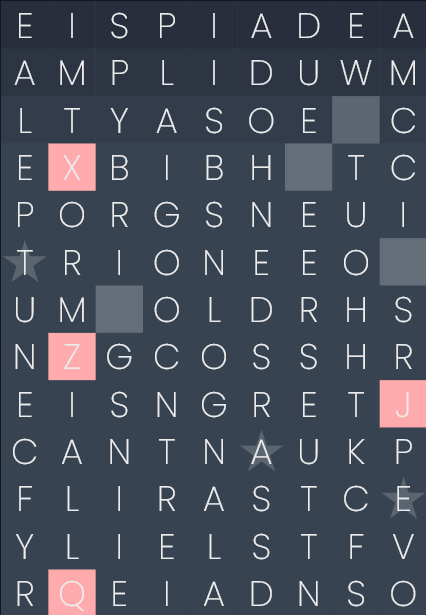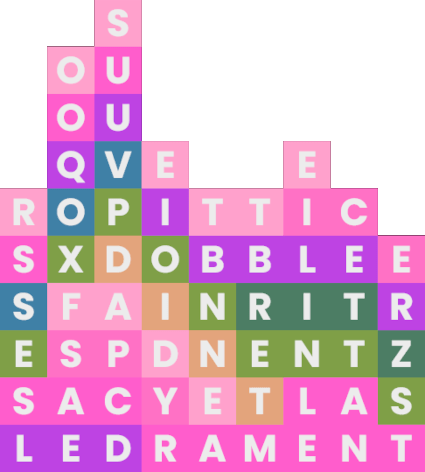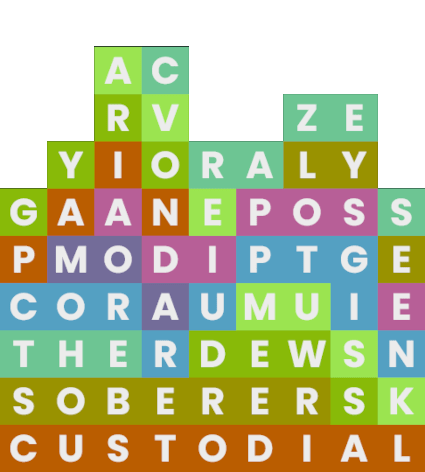I was not at all prepared for the onslaught of time here.
Hey, have you heard of Puzzmo? It’s a website that does a bunch of engaging, carefully cultivated and constructed puzzle games, you know, like like the page from a newspaper, oh okay, okay, so a newspaper was, like, okay, back in the day, to inform you of things like mustache wax sales and the latest asbestos explosions, a company would take a tree, and, rice, slice it very thin, then press that flat, and then they’d roll it up and throw it at your house. At some point in this exchange, people made money doing this, and that the media ecosystem in which sample bridge hand games flourished, alongside crosswords and the entire Garfield media empire.
Anyway, Puzzmo is like that, as a reference frame, except, like, really good.
Puzzmo is a website. You can go to Puzzmo, and it will show you a crossword, a chess puzzle, a jumbled up word puzzle, and a type of game called Spelltower. Oh wait, I guess I can’t just treat Spelltower like everyone knows Spelltower.
Okay, then, if you don’t know Spelltower, you can just go to the google store and download Spelltower onto your phone and play it right there. It’s a word finder game with gravity. Long words are worth more points, but they destroy letters around them, and those letters get you points, but there’s a big bonus for getting rid of all the letters by the end of the game, and that puts you in tension with long and short words. When you play Spelltower, you don’t want to thoughtlessly blow up the middle of the tower and leave long, unuseful stacks on the sides, because doing that leaves you with a bunch of little nubbins at the bottom that literally cannot connect to anything. If you do know Spelltower, Puzzmo’s version does this cool flashy rainbow animation when you clear it, and that’s really cool feeling when you get to see it. Further complicating Puzzmo is that some challenging letters (X, Q, Z and J) give you a bonus for using them in a word – they blow up their entire row – and three letters every tower will have a star on them, which multiply the score of the word.
These bonuses stack.
If you get two stars in one word, its score triples. If you get two stars and a challenging letter, it triples the letters in the word but also everything in that big blow up. And when one of those challenging letters is part of that, it’ll triple all the letters in that row as well, and if you think ‘wow, I guess I should try and learn all the words that can use Q without a U,’ then you have a brain like mine and that’s how I learned the Arabic word وَقْف, and its romanisation Waqf, which yes, can be pluralised, and that means you can have Waqfs, which crosses the four-letter long line and becomes a five letter word and will blow up larger groups of letters around it and when I pulled that out, and yes, I’m kind of just excited about Waqf and getting to use it.
Oh, and it’s timed.
Puzzmo is a weird kind of speed game to consider in this, the week of GDQ, but bear with me. The crosswords are timed. There’s a leaderboard where you can see how quickly you do your crossword compared to other people. There’s a timer system, but also, you can hide the timer, so you don’t have to operate any kind of pressure. And yeah, that was how I kinda got pulled to talk about Puzzmo. It’s a speed game but the only person you’re racing is yourself, and the game is deliberately broken up so you can’t grind yourself out and become exhausted by it, right? It’s a place to play with the idea of speed, but you could also focus on trying to maximise your score, and it’s also very satisfying.
I had no intention, at first, to ever write a Game Pile about Puzzmo. Then I saw, looking at my statistics with Fox one night that I’ve played twenty five hours of four minute word puzzles.
The first time I heard about Puzzmo, it was a toot on Mastodon that described itself as making ‘thoughtful puzzle games.’ This is for a website I have paid exactly zero dollars into and which tempted me to check it out by making sure that I had to solve a puzzle and then solve another puzzle to get the URL to get into Puzzmo, and then every day, Fox and I set up the TV and we’d do things like Spelltower and the Crossword puzzle together. It’s kind of hard to escape how good Puzzmo is at being what it is, a unit of fun puzzles to play with with high quality varied presentation and just the right kind of crossword puzzles to leave us, Australians, really mad at how centralised they are to America. Twenty five hours of this – when I write this but I’m confident it’ll be a lot higher by the time this goes up – is a good sign that the thing is itself, a really good thing.
And it’s free. It doesn’t have to be, you could pay a subscription cost and in the process, get access to an archive of puzzles and even more puzzles every day. At first, as presented, it looked like this was the whole model for how Puzzmo made money at all: a good service where the top tier of interest would pay money to the maintenance of the website, and all I was going to expect was a modest ongoing addition of game modes and that’s all I needed it to be. Simply put, I thought Puzzmo was a beautiful little niche of Nice Internet Material that reminded me of a better day of internet stuff.
Anyway, the second time I heard about Puzzmo, it was on Checkpoint, explaining that not only had Puzzmo been financed by the Hearst Group, it was now being bought by the Hearst Group, and was now attached, free, to a bunch of newspaper subscription and news services. It’s not like it’s a bad thing for a game to, as it were, aquire ye bag. There isn’t anything about Puzzmo that necessitates it being bad that it’s currently owned by a company that’s owned things like major controlling interests in Verizon.
What does matter is trust.
Right now, every single time I’ve been playing an online game, a corporate — like, impersonal and organisational and profit-driven — host has a consistent trend towards getting worse. You might have heard of this as enshittification. It probably came up with a conversation about paywalls, or maybe even Wordle. I’m not saying Wordle is bad now — but Wordle is a thing a newspaper owns so they can encourage me to engage with their newspaper, and that newspaper has some really weird opinions. And you know, take what you want out of systems like that, gold from dragons, I don’t have a problem with that.
It just makes me pause.
I was very close, before the door closed, to buying a lifetime subscription to Puzzmo. After all, it was a game I was playing every day with Fox. Money choices and best practices meant that I opted against doing it, but there were times I might have done it, if I was more flush with Patreon coinage.
And now, I don’t know if I’ll ever pay into Puzzmo. Not because it’s bad or even because it might be bad, though I absolutely am convinced now that over time, Puzzmo is going to get worse. Just the natural byproduct of the enshittification of the internet, as companies enclose around the things we use and care about.
You should go try out Puzzmo. It might be the best, today, it’ll ever be.



2 Comments
@updates Fun update on this one: I abandoned Puzzmo about two days after I wrote this article, three weeks ago. I had problems with the way they weren't adhering to a consistent checkable dictionary and ignored commonwealth spellings of words, and realised it would never have a reason to improve that feature.
@updates @Talen_Lee Oof, I hadn't heard about the Hearst acquisition. Mixed feelings about that, for all the reasons you mention.